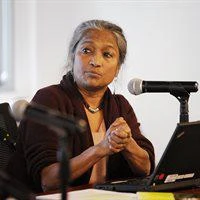Professor Naila Kabeer

Connect
About
Naila Kabeer is Professor of Gender and Development at the Department of International Development. Naila is also a Faculty Associate at LSE’s International Inequalities Institute and on the governing board of the Atlantic Fellowship for Social and Economic Equity. She has done extensive advisory work with international agencies (World Bank, ADB, UNDP, UN Women), bilateral agencies (DFID, SIDA, CIDA, IDRC) and NGOs (Oxfam, Action Aid, BRAC, PRADAN and Nijera Kori). Her most recent projects were supported by ERSC-DIFD Funded Research on Poverty Alleviation: Gender and Labour Market dynamics in Bangladesh and West Bengal. She is on the editorial boards of Feminist Economics and Gender and Development and on the international advisory board of the Canadian Journal of Development Studies She is also a member of the Inequalities Advisory Group, Bosch Foundation and a member of the Advisory Board of the United Nations University Institute for Global Health.
Please note that Professor Kabeer will not be accepting new PhD students.
Expertise
gender, poverty, social exclusion, livelihoods, social protection and citizenship